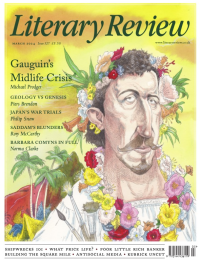William Whyte
Where Wren Meets Richard Rogers
The City in the City: Architecture and Change in London’s Financial District
By Amy Thomas
MIT Press 350pp £29
It is 1715 and Nicholas Hawksmoor is complaining again. ‘When London was Burnt in 1666, out of that fatall accidentall mischief one might have expected some good,’ the eminent architect observes. Yet instead of a ‘convenient regular well built Citty’, the greed of the inhabitants had secured only ‘a Chaos of Dirty Rotten Sheds … with winding Crooked passages (scarce practicable)’.
Hawksmoor’s objections were part of a long-standing tradition. Nearly half a century before, a poet had criticised the wealthy men and women of London for their desire to outbuild each other:
Go to Cheapside, and see who dares deny,
The City doth not love Conformity,
Here all ambitious thoughts are laid a side,
They build their houses with an Equall pride.
This conspicuous construction, the verse concluded, had despoiled the city, as the rich eschewed good taste and uniformity in favour of vulgar display.
The City of London has, in truth, almost always disappointed the architectural cognoscenti. For some, like Hawksmoor, penny-pinching is the problem. For others, like our poet, an excess of money is the real issue. But for both, London’s heart has always been underwhelming, lacking the style or scale or savoir-faire

Sign Up to our newsletter
Receive free articles, highlights from the archive, news, details of prizes, and much more.@Lit_Review
Follow Literary Review on Twitter
Twitter Feed
Under its longest-serving editor, Graydon Carter, Vanity Fair was that rare thing – a New York society magazine that published serious journalism.
@PeterPeteryork looks at what Carter got right.
Peter York - Deluxe Editions
Peter York: Deluxe Editions - When the Going Was Good: An Editor’s Adventures During the Last Golden Age of Magazines by Graydon Carter
literaryreview.co.uk
Henry James returned to America in 1904 with three objectives: to see his brother William, to deliver a series of lectures on Balzac, and to gather material for a pair of books about modern America.
Peter Rose follows James out west.
Peter Rose - The Restless Analyst
Peter Rose: The Restless Analyst - Henry James Comes Home: Rediscovering America in the Gilded Age by Peter Brooks...
literaryreview.co.uk
Vladimir Putin served his apprenticeship in the KGB toward the end of the Cold War, a period during which Western societies were infiltrated by so-called 'illegals'.
Piers Brendon examines how the culture of Soviet spycraft shaped his thinking.
Piers Brendon - Tinker, Tailor, Sleeper, Troll
Piers Brendon: Tinker, Tailor, Sleeper, Troll - The Illegals: Russia’s Most Audacious Spies and the Plot to Infiltrate the West by Shaun Walker
literaryreview.co.uk